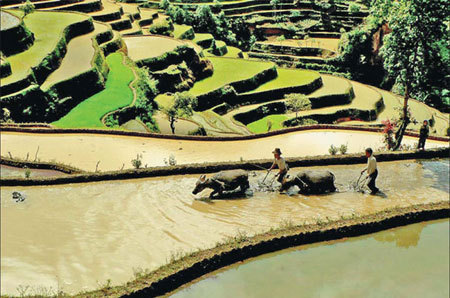


Part1 Latest:Hani terrace inscribed as World Heritage site
Hani rice terraces in UNESCO heritage
The International Council on Monuments and Sites had nominated the rice terraces in Honghe Hani and Yi autonomous region in Yunnanprovince, Southwest China.
"The Honghe Hani terraces are an outstanding reflection of elaborate and finely tuned agricultural, forestry and water-distribution systems that are reinforced by long-standing and distinctive socioeconomic-religious systems," the council said.
|
Terraces cultivate global recognition The Honghe Hani Rice Terraces rise up the Ailao Mountains from the Honghe River's southern bank. They span four counties in the Honghe Hani and Yi autonomous prefecture in southeastern Yunnan province. This man-made wonder was inducted into UNESCO's World Heritage List on Saturday at the World Heritage Committee's 37th session in Phnom Penh, Cambodia. The nominated area and buffer zone is in Yuanyang county, which covers 461 square kilometers and displays the most concentrated and best-developed terraces in three valleys.
|
 |
Part 2 Overview of Hani Terrace
|
Stairway to Heaven - Hani Terrace On the banks of Honghe River in South China'sYunnanProvince are millions of acres of agricultural and ecological wonders - otherwise known as the Honghe Hani Terrace. The Hani People, creators of this wonder, originated from the Tibetan Plateau on the upper reaches of the Yellow River. After centuries of migration, a group of the ancient Qiang people settled down in the Ailao Mountains in Southern Yunnan, and became today's Hani race. About 600,000 Hani people still dwell in the region and their ancestors totally altered the landforms there to grow crops to feed themselves, yet the ecology was not damaged. In fact, they have made the place even more attractive, presenting a perfect testimony to harmony between man and nature. |
| In May and June, the Honghe Hani Rice Terraces are a patchwork of fresh green. Li Jincan / for China Daily | Father and son return from the paddy fields, with a fish for the dinner table. Photos by Li Jincan / for China Daily |
Part 3 Eat in Hani Terrace
|
The Hani hill terraces have traditionally been planted with ancient varieties of rice, often a red rice that is full of fiber. Before the rest of the world was expounding the benefits of unpolished rice, the Hani people were already eating it as a staple. |
||
| Locavores from the Hani hills | ||
| Hani red rice is a delicious, nutty, all-natural grain. |
As soon as the rice is planted,a whole ecosystem starts. |
Rice terrace ducks provide the Hani with large rich eggs with yolks the color of liquid amber |
Part 4 Hani People
|
|
Shelives and dreams about them and when she talks, her eyes light up with the inner fire of her convictions. Pauline D. Loh speaks to Zhang Hongzhen, the chief crusader for the preservation of the Honghe Hani terraced fields.
She is 48, born in the Year of the Dragon, and her consuming passion glows like a fiery aura about her. While she has the vision to see beyond the present and anticipate the problems of preservation of the Honghe Hani Rice Terraces, she also has an intimate eye and attention for detail. She wants to show us all that is good about the Hani agriculture heritage, and she goes to great lengths to showcase it all at its best. So, she makes sure we taste the finest localteaas we gather in her room for a chat about her favorite subject. |
Part 5 Photos of Hani Terrace
 |
Part 6 World Heritage sites in China
| Tianshan | TheTemple of Heaven | Yunnan fossil site |
|
The 37th session of UNESCO's World Heritage Committee (WHC) on June 21,2013 inscribed northwest China's Xinjiang Tianshan natural site on the World Heritage List, the session's chairman announced. |
Covering an area of 273 hectares, the Temple of Heaven is the biggest and the most complete existing imperial sacrificial building complex in the world. It was inscribed as a UNESCO World Heritage Site in 1998 |
An area in Southwest China that boasts fossils dating back as far as 530 million years has been included on the World Heritage List. |
For other World Heritage sites in China, pleaseclick here